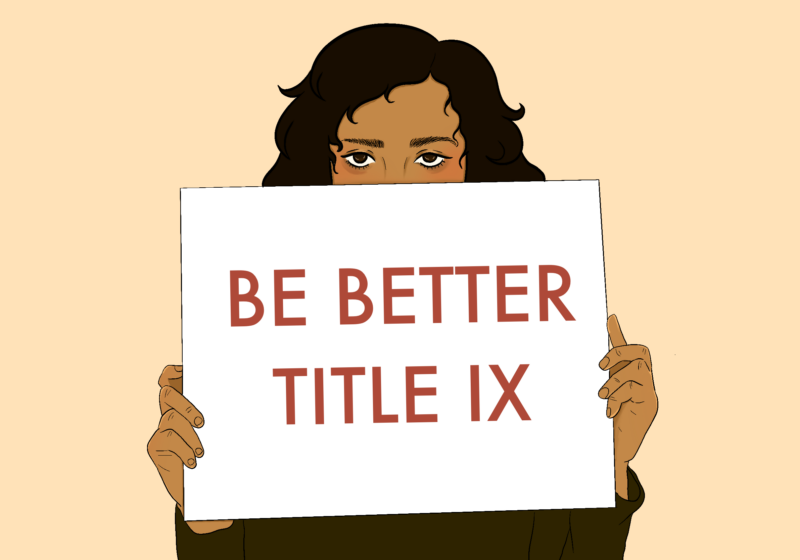On Monday, March 13, the Office of Equity and Inclusion sent out an email inviting students to fill out a survey regarding the campus climate on sexual assault and misconduct. The extensive survey is due April 10. It is entirely voluntary. However, students are strongly encouraged to participate.
The survey came out a few weeks after the attack in Wilder Tower, which sparked discussion about the safety of women on campus. The Wilder attack is not unique but garnered lots of attention due to its public nature. In addition to discussions of safety, the attack also prompted conversations regarding the University’s handling of sexual assault and misconduct.
Many students took to their various social media pages to express concerns about the discrepancies between the University’s treatment of white survivors and survivors of color. Sophomore Seulgi Dianne Lee claims that the University silences students of color who experience sexual assault.
“The University has made it abundantly clear to their students of color — especially women of color — that our voices won’t be recognized,” said Lee.
Lee went on to discuss the University’s handling of a situation similar to the Wilder attack. Except, in this instance, the victim was a woman of color. There was a clear difference in treatment between the two cases, and Lee believes that this dissimilarity was based on the color of the student’s skin.
“I can’t even say that seeing the disparity in treatment was any sort of surprise. It was just another disappointing occurrence in a pattern of behavior,” said Lee.
Lee is not the only one with these concerns. Many other students have expressed similar anxieties. When the Office of Equity released the campus climate survey three weeks after the Wilder attack, students believed that maybe their voices would be heard.
Unfortunately, it does not appear this will happen.
The survey is anonymous but lengthy. It asks invasive questions regarding students’ experiences with sexual assault, asking for the details of students’ experiences. It is especially intrusive when it asks if the student utilized any campus resources, including the Title IX office.
If a student is to respond no, the survey asks why, but students must pick between pre-written answers. The question does not give students the opportunity to express their concerns to the fullest extent.
When asked about the survey, Title IX Coordinator Catherine (“Kate”) Nearpass, stated that it was created by the Association of American Universities (“AAU”).
“NYS Education Law sec. 129b requires that higher education institutions in NYS issue a bi-annual assessment of students’ knowledge and awareness of processes available to them for reporting concerns of sexual misconduct,” said Nearpass.
Nearpass told us that the survey must include the following:
“1. The Title IX Coordinator’s role.
- Campus policies and procedures addressing sexual assault;
- How and where to report domestic violence, dating violence, stalking or sexual assault as a victim, survivor or witness;
- The availability of resources on and off campus, such as counseling, health and academic assistance;
- The prevalence of victimization and perpetration of domestic violence, dating violence, stalking, or sexual assault on and off campus;
- Bystander attitudes and behavior;
- Whether reporting individuals disclosed to the institution and/or law enforcement, experiences with reporting and institution process and reasons why they did or did not report;
- The general awareness of the difference, if any, between the institution’s policies and the penal law; and
- General awareness of the definition of affirmative consent.”
The survey includes the above-mentioned. However, nowhere does the law require that a survey ask students for details about their assaults, which this survey does. The survey’s response options to various questions are also extremely biased and limited.
Nearpass did not address questions about the invasive nature of certain questions nor the timing of this survey in regard to the Wilder Tower incident.
On Monday, two weeks after the initial release of the survey, concerns regarding the survey seemed to have been entirely ignored.
President Mangelsdorf sent out an email to the student body encouraging them to fill out the survey.
“As you know, this is a critically important survey, and the results will help us guide policy and programming for years to come. But this survey is more than a policy tool. It is one of the most effective and measurable ways that we can live our Meliora values,” said Manglesdorf in her email.
However, if Mangelsdorf wants to see how the University handles sexual assault and misconduct, then she does not have to look any further than social media, where angry students have expressed their thoughts.
We can live our “Meliora values” when the university starts listening to survivors to enact real change.





